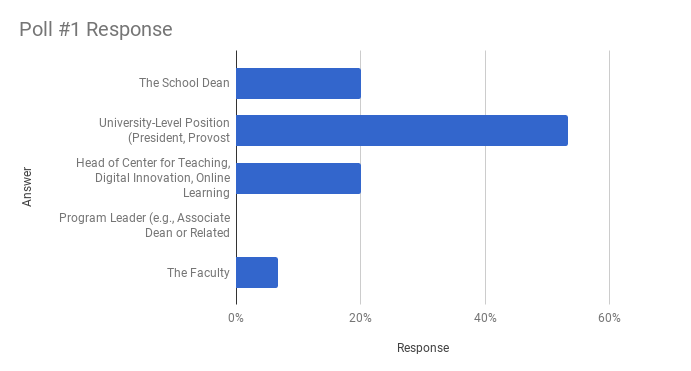Extension Engine’s perspective — We believe that online strategy should be set at the highest levels and that excellence should be prioritized over standardization. What did recent webinar attendees think?

When we do webinars, we make our audience work a bit. We create polls and get them to ask questions — we believe it makes the event more engaging and results in better learning.
Last week I hosted a webinar called “Dr. Moore’s Malaise,” which featured a discussion between Dr. Scott Moore of Extension Engine and Eduventures’ Principal Analyst Howard Lurie. Live and unscripted, the dialogue was lively and thought-provoking.
You can read the recap here or watch the webinar replay here.
We thought we’d share two insights from the audience polls and comment on the results. The audience members primarily held senior and mid-level positions at U.S.-based colleges and universities.
So with a small, nonrandom sample size, it was certainly not a scientific survey; the results are interesting, nonetheless.
The premise of the discussion was that too many institutions make standardization the primary goal of online learning and that they should be prioritizing excellence. Of course nobody is ever going to say you shouldn’t prioritize excellence, so lets’ define these terms a bit more.
Dr. Moore used the term “standardization” as a way to refer to the genericizing of the overall educational technology stack (that is, all of those applications that a school uses to deliver services internally and to students), where the focus is on enforcing a standard stack for all, regardless of school or program.
This stack ranges from student information systems to learning management systems (LMS; e.g., Blackboard) and includes email clients, messaging systems, supported web browsers, etc.
He defined “excellence” as an experience that’s specific and unique to each program, building on each program’s unique pedagogies, needs, and desires — not one standard experience across the university as a whole.
The creation of the online experience is based on the learning outcomes and experience for each individual program. Further, when thinking about the learning experience, one must consider the experience of students, faculty, and staff.
So on the surface, it’s pretty hard to argue that you wouldn’t want excellence. But what are institutions doing? And who is making the decisions?
Who’s in charge around here?
We asked:
“At your school or college, who determines the strategic direction of the online degree programs?”
The results came back overwhelmingly (of those who work in higher education) that online strategy is determined at the university level, by president or provost.
Question: “At your school or college, who determines the strategic direction of the online degree programs?” Results excluded those who do not work at a university or college.

Except it usually isn’t — at least not at most of the institutions we speak with.
Sure, the president or provost is involved and has ultimate decision authority, but other than at institutions firmly committed to online learning, we see real strategy being formed a level or two below provost or president.
And you know what happens — there are multiple strategies, lack of buy-in, stuck project, and not enough money committed long term to do anything really innovative.
We see too few university leaders actually driving strategy — they are more often simply reactive to disjointed proposals from people working in their organization. And these colleagues, if the results above are representative, believe that leadership does drive the strategic direction.
The lesson here, from our perspective, is that there may be a disconnect.
University leadership should create a proactive, visible, and widely shared online learning strategy with a strong vision that provides direction and guidelines for those at the school or program level to work within.
What is the strategy anyway?
Let’s go back to standardization versus excellence. Dr. Moore’s malaise was that standardization is not, and should not be, the core strategy.
A goal or outcome? Maybe. But a core strategy, no.
Senior leadership should focus strategy on the quality of the learning experience for all who are involved. Strategy should go beyond a focus on a lack of bugs, software uptime, or other functional measures. It should get the online leader to think about how well the user is able to access services conveniently and how well the user is able to access and participate in the learning experience.
At each university, school, and program “excellence” can be defined differently depending on what dimensions of the educational process, which pedagogies, and what types of experience are important to you.
And so where are we on this dimension? Again, we asked the audience what the priority should be, and the results were mixed.
Question: “Consider the following statement: ‘Leaders in online learning should prioritize excellence over standardization.’ What is your reaction?” Results excluded those who do not work at a university or college.
.png?width=800&height=301&name=chart%20(1).png)
What does this tell us? Our guess is that this is not a discussion that is actively happening today.
That when strategy starts with standardization, there are no alarm bells going off indicating that standardization is a secondary discussion.
It’s one of the reasons we held the webinar, and why we hope to provoke thought and dialogue.
And what do you think?
While we joked in the webinar that Dr. Moore was very angry, he is actually a really nice guy, and as a former dean and faculty member, he is always up for friendly debate and discussion, or to provide insight and advice. Contact him here to set up time to talk.
Watch the discussion
Take a look at the webinar discussion (it’s only 30 minutes, plus 15 minutes of Q&A) and let us know what you think about standardization vs. excellence.